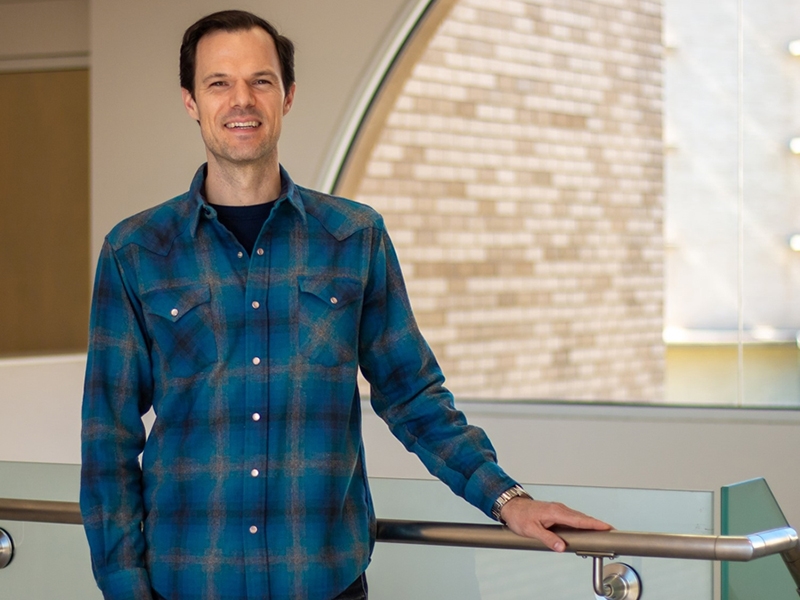Graduate and international education is all about discoveries — the discovery of knowledge, the discovery of research and creative scholarship that improves lives, and the discovery of new countries, cultures and people. The Graduate School and International Education is celebrating our students, faculty and staff that make discoveries happen at the U of A.
Andy Brownback, associate professor of economics in the Sam M. Walton College of Business, teaches students from all walks of life — undergraduate, graduate, international and domestic. But graduate students are one of his favorite populations to teach.
"Graduate courses are always fun because these students are very motivated to be here, absorbing and presenting information that is exciting to them," he said.
"Learning new information is something that students are excited about," he continued. "As a teacher, it is extremely fun when students are so excited that they are pulling content out of you. And then, it is even more fun to see what students turn it into for their own research."
Brownback finds it most rewarding to see students take the information he teaches and go their own direction with it.
"Graduate students will end up putting years of their life into doing some really cool things with the concepts they're taught in class," he said.
Though he does not view himself as a mathematician, one of his favorite courses he teaches is a math boot camp class called "Math for Economics." He also teaches a second graduate level course that is "closer to his heart," which is in the field of behavioral economics — a subject he is most passionate about and thus is his research and teaching focus.
"In the microeconomics subfield, we are looking at the way individuals behave through interactions with other individuals, in the marketplace or in making decisions on their own," he said. "I enjoy this field because the study of individuals can provide a foundation for all other fields of study. Individuals aggregate into organizations, systems and the economy as a whole."
Conducting experiments is the primary way Brownback studies behavioral economics — including utilizing paid human subjects, many of whom are graduate students. Participants in the experiments are asked to interact with some type of economic stimulus, such as a change in price or a change in the rules of interaction, and Brownback and his collaborators will observe how they behave.
"It is potentially a strategic interaction where you're playing either with or against another player, and then looking at the ways their behavior aligns with what we would think regarding rational economic theory, where I may be maximizing utility in a very specific way versus how their behavior aligns with what some would call irrational. If those ways are predictable and not just mistakes and are patterns of behavior that are that are repeatable and consistent, then we start to develop new theories of how people really behave to help us adjust these types of rational models."
He is motivated to come to work every day because of his love for his students.
"I get a lot of energy out of teaching new material and being in front of my students, and if I am going to be advising them, I love seeing the ways that they develop their own research agendas and absorb new material and bring in new ideas," he said.
When he is not teaching, he has time devoted to research. Those days for him are equally engaging and provide opportunities for him to ask questions that others might not be asking, then develop a strategy for them.
"Research days are very stimulating. They're very stimulating intellectually, but they're also problem-solving tasks," he said. "So, that is also a great part of the job — to pick up a puzzle and try to figure it out. I think those are the key aspects of what makes my job both exciting and difficult, even with students. You might be teaching something, and the students just aren't getting it, and you can figure out a new way of presenting it."
He has been with the university for eight years. He is originally from Topeka, Kansas, and earned his bachelor's in economics and math from Kansas State and his Ph.D. from University of California San Diego in economics.
In his free time, Brownback loves spending time with his 18-month-old daughter, playing tennis and woodworking. He is also involved in his church and volunteers with local charities.
Topics
Contacts
Bethany Tilley, graduate assistant
Graduate School and International Education
479-575-4853,
John Post, director of communications
Graduate School and International Education
479-575-4853,
